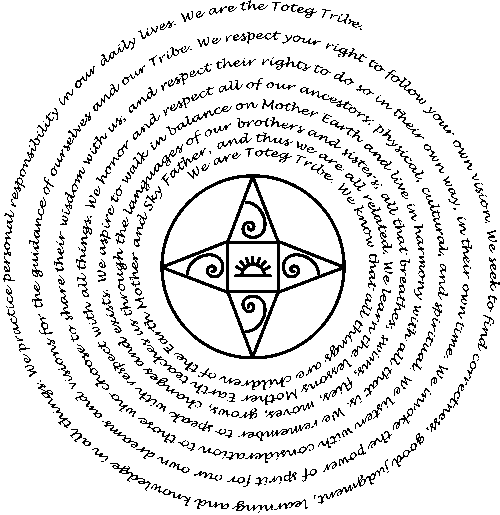 The Ethic Of Reciprocity
The Ethic Of Reciprocity 
 The Ethic Of Reciprocity
The Ethic Of Reciprocity 
The Ethic Of Reciprocity, otherwise known as The Golden Rule, is found in the scriptures of nearly every religion. It is considered a condensation in one statement of all longer lists of ethical dos and don'ts. T.O.T.E.G. adopted it as the basic ethical guidline for our people in 1984, with the understanding that it must be intelligently and cautiously applied since there is no absolute standard as to what is helpful or harmful to everyone or everything The following is the way the Ethic of Reciprocity is phrased in many of the major religions of the world.
| African Traditional Religions | One
going to take a pointed stick to pinch a baby bird should first try it
on himself to feel how it hurts. [Yoruba Proverb (Nigeria) ]
|
| Bahá'í Faith | And
if thine eyes be turned towards justice, choose thou for thy neighbour
that which thou choosest for thyself. [ Epistle to the Son of the Wolf,
30 ]
|
| Buddhism : | Hurt not others in ways that
you yourself would find hurtful. [ Udana-Varga 5,1 ]
|
| Christianity : | All
things whatsoever ye would that men should do to you, do ye so to
them; for this is the law and the prophets. [ Matthew 7:1 ]
|
| Confucianism : | Do not do to others what
you would not like yourself. Then there will be no resentment against you,
either in the family or in the state. [ Analects12:2 ]
|
| Hinduism, Brahmanism : | This is the sum of duty;
do naught onto others what you would not have them do unto you. [ Mahabharata
5,1517 ]
|
| Islam : | No one of you is a believer
until he desires for his brother that which he desires for himself. [ Sunnah
]
|
| Judaism : | What is hateful to you, do
not do to your fellowman. This is the entire Law; all the rest is commentary.
[ Talmud, Shabbat 3id ]
|
| Shinto : | "The heart of the person
before you is a mirror. See there your own form"
|
| Taoism : | Regard your neighbor’s gain
as your gain, and your neighbor’s loss as your own loss. [ Tai Shang Kan
Yin P’ien ]
|
| Zoroastrianism : | That nature alone is good
which refrains from doing to another whatsoever is not good for itself.
[ Dadisten-I-dinik, 94,5 ]
|
| Jainism: | A man should wander about
treating all creatures as he himself would be treated. Sutrakritanga 1.11.33
|
| Native American Spirituality | "All things are our relatives;
what we do to everything, we do to ourselves. All is really One." Black
Elk
|
| Plato: | May I do to others as I would
that they should do unto me. (Greece; 4th century BCE)
|
| Roman Pagan Religion: | "The law imprinted on the
hearts of all men is to love the members of society as themselves."
|
| Principles of Scientology: | 20: "Try to treat others
as you would want them to treat you."
|
| Seneca: | "Treat your inferiors as
you would be treated by your superiors," Epistle 47:11 (Rome; 1st century
CE)
|
| Socrates: | "Do not do to others that
which would anger you if others did it to you." (Greece; 5th century BCE)
|
| Sikhism: | "No one is my enemy, none
a stranger and everyone is my friend." Guru Arjan Dev : AG 1299
|
| Sufism: | "The basis of Sufism is consideration
of the hearts and feelings of others. If you haven't the will to gladden
someone's heart, then at least beware lest you hurt someone's heart, for
on our path, no sin exists but this." Dr. Javad Nurbakhsh, Master of the
Nimatullahi Sufi Order
|
| Unitarian Universalism | "We affirm and promote respect
for the interdependent web of all existence of which we are a part." 7th
Principle of Unitarian Universalism
|
| Wicca: | "An it harm no one, do what thou wilt" (i.e. do what ever you want to, as long as it harms nobody, including yourself). The Wiccan Rede |
|
|
|
|
|
|
|